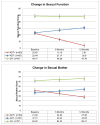Effect of androgen deprivation therapy on sexual function and bother in men with prostate cancer: A controlled comparison
- PMID: 28557112
- PMCID: PMC5709275
- DOI: 10.1002/pon.4463
Effect of androgen deprivation therapy on sexual function and bother in men with prostate cancer: A controlled comparison
Abstract
Objectives: The adverse sexual effects of androgen deprivation therapy (ADT) on men with prostate cancer have been well described. Less well known is the relative degree of sexual dysfunction and bother associated with ADT compared to other primary treatment modalities such as radical prostatectomy. We sought to describe the trajectory and relative magnitude of changes in sexual function and bother in men on ADT and to examine demographic and clinical predictors of ADT's adverse sexual effects.
Methods: Prostate cancer patients treated with ADT (n = 60) completed assessments of sexual function and sexual bother 3 times during a 1-year period after the initiation of ADT. Prostate cancer patients treated with radical prostatectomy only and not receiving ADT (n = 85) and men with no history of cancer (n = 86) matched on age and education completed assessments at similar intervals.
Results: Androgen deprivation therapy recipients reported worsening sexual function and increasing bother over time compared to controls. Effect sizes for the differences in sexual function were large to very large, and for bother were small to very large. Age younger than 83 years predicted relatively poorer sexual function, and age younger than 78 years predicted greater sexual bother at 12 months in men on ADT compared to men not on ADT.
Conclusions: Most men on ADT for prostate cancer will never return to baseline levels of sexual function. Interventions focused on sexual bother over function and designed to help couples build and maintain satisfying relationship intimacy are likely to more positively affect men's psychological well-being while on ADT than medical or sexual aids targeting sexual dysfunction.
Keywords: androgen deprivation therapy; cancer; oncology; prostate; sexual bother; sexual function; sexual health.
Copyright © 2017 John Wiley & Sons, Ltd.
Figures
Similar articles
-
Sexual bother in men with advanced prostate cancer undergoing androgen deprivation therapy.J Sex Med. 2014 Oct;11(10):2571-80. doi: 10.1111/jsm.12645. Epub 2014 Jul 24. J Sex Med. 2014. PMID: 25059094 Free PMC article. Clinical Trial.
-
Mood, sexuality, and relational intimacy after starting androgen deprivation therapy: implications for couples.Support Care Cancer. 2018 Nov;26(11):3835-3842. doi: 10.1007/s00520-018-4251-9. Epub 2018 May 18. Support Care Cancer. 2018. PMID: 29777382
-
The perspective of prostate cancer patients and patients' partners on the psychological burden of androgen deprivation and the dyadic adjustment of prostate cancer couples.Psychooncology. 2016 Jul;25(7):823-31. doi: 10.1002/pon.3930. Epub 2015 Sep 28. Psychooncology. 2016. PMID: 26411285
-
The effect of androgen deprivation therapy on health-related quality of life in men with prostate cancer.Urology. 2001 Aug;58(2 Suppl 1):94-100. doi: 10.1016/s0090-4295(01)01250-x. Urology. 2001. PMID: 11502459 Review.
-
Psychological effects of androgen-deprivation therapy on men with prostate cancer and their partners.Cancer. 2015 Dec 15;121(24):4286-99. doi: 10.1002/cncr.29672. Epub 2015 Sep 15. Cancer. 2015. PMID: 26372364 Review.
Cited by
-
Marital status and perceived stress in men with advanced prostate cancer: A randomized-controlled trial of cognitive behavioral stress management.J Psychosom Res. 2023 Apr;167:111198. doi: 10.1016/j.jpsychores.2023.111198. Epub 2023 Feb 16. J Psychosom Res. 2023. PMID: 36812663 Free PMC article. Clinical Trial.
-
The Relative Impact of Urinary and Sexual Function vs Bother on Health Utility for Men With Prostate Cancer.JNCI Cancer Spectr. 2020 May 25;4(5):pkaa044. doi: 10.1093/jncics/pkaa044. eCollection 2020 Oct. JNCI Cancer Spectr. 2020. PMID: 33134826 Free PMC article.
-
Androgen receptors in areas of the spinal cord and brainstem: A study in adult male cats.J Anat. 2021 Jul;239(1):125-135. doi: 10.1111/joa.13407. Epub 2021 Feb 22. J Anat. 2021. PMID: 33619726 Free PMC article.
-
Ejaculatory function after radiotherapy for prostate cancer: a systematic review and meta-analysis.Prostate Cancer Prostatic Dis. 2024 Sep 14. doi: 10.1038/s41391-024-00882-4. Online ahead of print. Prostate Cancer Prostatic Dis. 2024. PMID: 39277705 Review.
-
Impact of neoadjuvant relugolix on patient-reported sexual function and bother.Front Oncol. 2024 Apr 11;14:1377103. doi: 10.3389/fonc.2024.1377103. eCollection 2024. Front Oncol. 2024. PMID: 38665954 Free PMC article.
References
-
- American Cancer Society Facts and Figures. Atlanta, GA: American Cancer Society; 2016.
-
- Grossmann M, Cheung AS, Zajac JD. Androgens and prostate cancer; pathogenesis and deprivation therapy. Best Pract Res Clin Endocrinol Metab. 2013;27:603–616. - PubMed
-
- Fode M, Sonksen J. Sexual funtion in elderly men receiving androgen deprivation therapy (ADT) Sex Med Rev. 2014;2:36–46. - PubMed
-
- Cetin K, Li S, Blaes AH, Stryker S, Liede A, Arneson TJ. Prevalence of patients with nonmetastatic prostate cancer on androgen deprivation therapy in the United States. Urol. 2013;81:1184–1189. - PubMed
-
- Donovan KA, Walker LM, Wassersug RJ, Thompson LM, Robinson JW. Psychological effects of androgen-deprivation therapy on men with prostate cancer and their partners. Cancer. 2015;121:4286–4299. - PubMed
Publication types
MeSH terms
Substances
Grants and funding
LinkOut - more resources
Full Text Sources
Other Literature Sources
Medical




